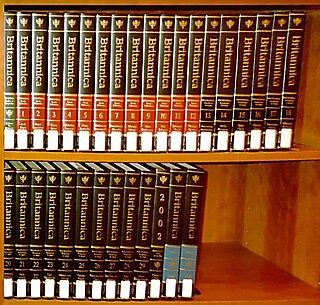
An encyclopedia or encyclopædia is a reference work or compendium providing summaries of knowledge either general or special to a particular field or discipline. Encyclopedias are divided into articles or entries that are arranged alphabetically by article name or by thematic categories, or else are hyperlinked and searchable. Encyclopedia entries are longer and more detailed than those in most dictionaries. Generally speaking, encyclopedia articles focus on factual information concerning the subject named in the article's title; this is unlike dictionary entries, which focus on linguistic information about words, such as their etymology, meaning, pronunciation, use, and grammatical forms.

Samson was the last of the judges of the ancient Israelites mentioned in the Book of Judges and one of the last leaders who "judged" Israel before the institution of the monarchy. He is sometimes considered as an Israelite version of the popular Near Eastern folk hero also embodied by the Sumerian Gilgamesh and Enkidu and the Greek Heracles.

Ramsey Abbey was a Benedictine abbey in Ramsey, Huntingdonshire, England. It was founded about AD 969 and dissolved in 1539.
Thomas Walsingham was an English chronicler, and is the source of much of the knowledge of the reigns of Richard II, Henry IV and Henry V, and the careers of John Wycliff and Wat Tyler.

Gluttony means over-indulgence and over-consumption of food or drink.

Ramsey is a market town and civil parish in the Huntingdonshire district of Cambridgeshire, England. The town is about 9 miles (14 km) north of Huntingdon. Ramsey parish includes the settlements of Ramsey Forty Foot, Ramsey Heights, Ramsey Mereside, Ramsey Hollow and Ramsey St Mary's.

The Nephilim are mysterious beings or people in the Hebrew Bible who are described as being large and strong. The word Nephilim is loosely translated as giants in most translations of the Hebrew Bible, but left untranslated in others. Some Jewish explanations interpret them as hybrid sons of fallen angels (demigods).
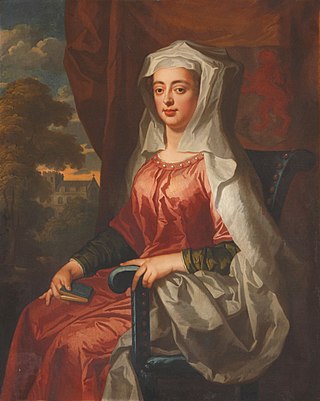
Dervorguilla of Galloway was a 'lady of substance' in 13th century Scotland, the wife from 1223 of John, 5th Baron de Balliol, and mother of John I, a future king of Scotland.

Oswald of Worcester was Archbishop of York from 972 to his death in 992. He was of Danish ancestry, but brought up by his uncle, Oda, who sent him to France to the abbey of Fleury to become a monk. After a number of years at Fleury, Oswald returned to England at the request of his uncle, who died before Oswald returned. With his uncle's death, Oswald needed a patron and turned to another kinsman, Oskytel, who had recently become Archbishop of York. His activity for Oskytel attracted the notice of Archbishop Dunstan who had Oswald consecrated as Bishop of Worcester in 961. In 972, Oswald was promoted to the see of York, although he continued to hold Worcester also.
Huntingdonshire was a Parliamentary constituency covering the county of Huntingdonshire in England. It was represented by two Members of Parliament in the House of Commons of England until 1707, then in the House of Commons of Great Britain from 1707 to 1800, and then in the House of Commons the Parliament of the United Kingdom from 1801 to 1885.
Ada de Warenne was the Anglo-Norman wife of Henry of Scotland, Earl of Northumbria and Earl of Huntingdon. She was the daughter of William de Warenne, 2nd Earl of Surrey by Elizabeth of Vermandois, and a great-granddaughter of Henry I of France. She was the mother of Malcolm IV and William I of Scotland.
The Old Testament is the first section of the two-part Christian biblical canon; the second section is the New Testament. The Old Testament includes the books of the Hebrew Bible (Tanakh) or protocanon, and in various Christian denominations also includes deuterocanonical books. Orthodox Christians, Catholics and Protestants use different canons, which differ with respect to the texts that are included in the Old Testament.
The Reverend George William Lemon was the author of an early etymological dictionary of the English language, published in 1783.

In various theistic religious traditions, an angel is a supernatural spiritual being who serves God.
Robert Wakefield was an English linguist and scholar.

Sir Richard Williams, also known as Sir Richard Cromwell, was a Welsh soldier and courtier in the reign of Henry VIII who knighted him on 2 May 1540. He was a maternal nephew of Thomas Cromwell, profiting from the Dissolution of the Monasteries in which he took an active part. He was the patrilineal great-grandfather of Oliver Cromwell.
Adalbert of Spalding was a supposed English theologian writer identified by Bale and Pitts, and discussed at length in the 1885 Dictionary of National Biography (DNB).
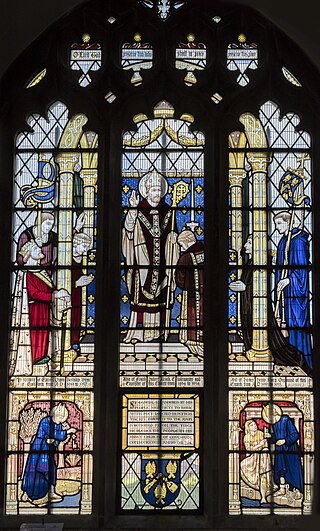
Saint Egwin of Evesham, OSB was a Benedictine monk and, later, the third Bishop of Worcester in England.
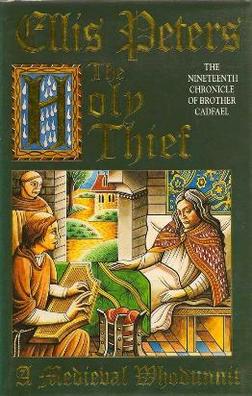
The Holy Thief is a medieval mystery novel by Ellis Peters set in 1144–1145. It is the 19th and penultimate volume of the Cadfael Chronicles, first published in 1992.
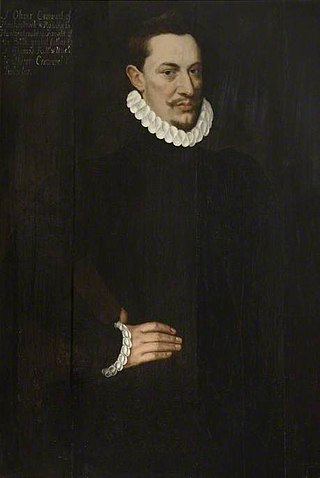
Sir Oliver Cromwell was an English landowner, lawyer and politician who sat in the House of Commons at various times between 1589 and 1625. He was the uncle of Oliver Cromwell, the Member of Parliament, general, and Lord Protector of England.












